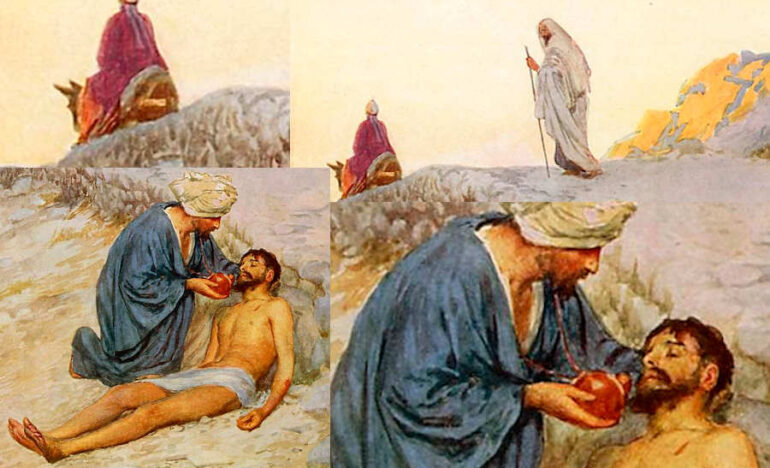Compassion in the Buddhist and Christian Traditions

By Kathy Keary
Part 11. Read all the parts of the Jesus and Buddha series here.
As we continue our focus on the Brahma-viharas in the Buddhist tradition, we turn our attention to one of the four states of mind, karuna (compassion), exploring this attribute from both a Buddhist and a Christian viewpoint.
In the article, “Four Immeasurables,” karuna or compassion is described as “a wise heartfelt motivation to relieve the pain, sorrow, and suffering of others.” Genuine concern for others is the impetus for compassion that is practiced in selfless acts of charity. The article elaborates: “With true Compassion we have deep insight into the causes of human suffering. Therefore, we are able to serve others in wise, loving, calm, and skillful ways without being overwhelmed by our feelings of pity, grief, or sadness.”
A compassionate state of mind eliminates negative attitudes such as cruelty, selfishness, and narrow-mindedness. Buddhism emphasizes that compassion must extend to all sentient beings.
Note: Never miss an article published on the Renewal Center website: Sign up to receive our newsletters
In the article, “The Four Brahma Viharas,” One Mind Dharma characterizes compassion as the outcome of metta (loving kindness) meeting suffering. The article asserts:
Whether it is suffering we experience, or the suffering of another, compassion is caring about and being present for the pain we all experience. Compassion is a quivering of the heart in response to suffering in the world…. Compassion means we “suffer with” ….We do allow our hearts to open to any suffering with which we come into contact.
In the words of the Buddha found in Scripture: “Just as a mother would protect her only child at the risk of her own life, even so, cultivate a boundless heart towards all beings. Let your thoughts of boundless love pervade the whole world” (Sutta Nipata 149-150).
A ritual designed to fortify compassion in one’s life is contained in Terry Cortés-Vega’s book, Buddhism for Healing: Practical Meditations, Mantras, and Rituals for Balance and Harmony. She suggests that compassion is nurtured by daily journaling your compassionate thoughts, words, and actions directed toward yourself and others that you experience on a given day. These acts can be as simple as using kind words or expressions of appreciation, smiling, listening without giving advice, or sharing your resources. She recommends that the practitioner record in a journal each day the answers to these questions:
- In what ways was I compassionate with myself today?
- How did I ease someone else’s suffering today?
It’s not a stretch to conclude that this practice would be a fruitful endeavor regardless of an individual’s faith tradition. This daily practice elevates the importance of exercising compassion in one’s life increasing one’s awareness and likelihood to act in this manner.
A summons to compassion is also a key aspect of Christianity. St. Paul could not be clearer in his letter to the Colossians:
Put on then, as God’s chosen ones, holy and beloved, heartfelt compassion, kindness, humility, gentleness, and patience, bearing with one another and forgiving one another, if one has a grievance against another; as the Lord has forgiven you, so must you also do. And over all these put on love, that is, the bond of perfection (3:12-14).
Pope Francis’ recent encyclical, Fratelli Tutti, On Fraternity and Social Friendship is a call to compassion in today’s world where injustice and division are commonplace. Central to his message is the Parable of The Good Samaritan (Luke 10:25-37 NIV – The Parable of the Good Samaritan – On – Bible Gateway). The Pope emphasizes: “We cannot be indifferent to suffering; we cannot allow anyone to go through life as an outcast. Instead, we should feel indignant, challenged to emerge from our comfortable isolation to be changed by our contact with human suffering.”
Pope Francis also references Matthew 25:35: “I was a stranger and you welcomed me” emphasizing that these words of Jesus compel us to recognize Christ in one another and insists that this reality shape our compassionate outreach to all people without exception.
New articles in this series are posted to the website every Monday. The full series can be found here: An Invitation to Something New: The Contemplative Life. On Thursday’s we’ll send an email to remind you of the articles.
In their book, Compassion: A Reflection on the Christian Life, the authors, Henri Nouwen, Donald P. McNeil, and Douglas A. Morrison emphasize that in the Christian tradition the divine is portrayed as a compassionate God, Immanuel, God-with-Us. Jesus became the obedient servant who did not cling to his divinity but emptied himself to experience life as we do. Jesus demonstrated works of compassion throughout his public life calling us to do likewise. In the words of these insightful authors:
Compassion asks us to go where it hurts, to enter into places of pain, to share in brokenness, fear, confusion, and anguish. Compassion challenges us to cry out with those in misery, to mourn with those who are lonely, to weep with those in tears. Compassion requires us to be weak with the weak, vulnerable with the vulnerable, and powerless with the powerless. Compassion means full immersion in the condition of being human.
In our next article, we will unpack the third Brahma-Vihara, joy, from both a Buddhist and Christian perspective.
References
Borg, Marcus. Jesus and Buddha: The Parallel Sayings. Berkley, California: Ulysses Press, 2004.
“Compassion.” Four Immeasurable, 2021. https://brahmaviharas.net/compassion-karuna
Cortes-Vega, Terry. Buddhism for Healing: Practical Meditations, Mantras, and Rituals for Balance and Harmony. Emeryville, California: Rockridge Press, 2020.
Nouwen, Henri; McNeil, Donald P.; and Morrison, Douglas A. Compassion: A Reflection on the Christian Life. New York, NY: DoubleDay, 1982.
Pope Francis. Fratelli Tutti: On Fraternity and Social Friendship. New London, CT: Twenty-third Publications, 2020.
“The Four Brahma Viharas.” One Mind Dharma. https://oneminddharma.com/brahma-viharas.
[Kathy Keary, a Precious Blood Companion and spiritual director, holds a master’s degree in theological studies and is a graduate of the Atchison Benedictine’s Sophia Center’s Souljourners Program, an intense study of spirituality and spiritual direction. Kathy believes that the divine is present and active in all of life and encourages others to be awakened to the God in all including the divine within. She enjoys accompanying others on their journey to wholeness discovering the person they were created to be.]
We’d Like to Hear From You!
We’d like to know what you think about this article. Send us a comment using the form below. Do you have a suggestion? Is there something you want to learn more about? Send us a note.
Related

Easter Bread (Pane di Pasqua)
By Lucia Ferrara
Easter bread is a fun bread. It’s a fun bread to make with your children, with your family, with neighbors and friends. The tradition of Easter bread dates back centuries and comes from many parts of the world.

Easter Sunday, the Resurrection of the Lord
Today’s scriptures tell us how three days changed the world. How have they changed you?
Categories
Assembling God's Puzzle Coffee with Padre Cooking & Spirituality Encounters of the 4th Kind Family Matters Reflections on the Eucharsitic Prayers Spiritual Resources Taize Prayers The Contemplative Life Traveling with Pilgrims of Hope Uncategorized Videos Week of Prayer for Uhristian Unity When you need a little help
